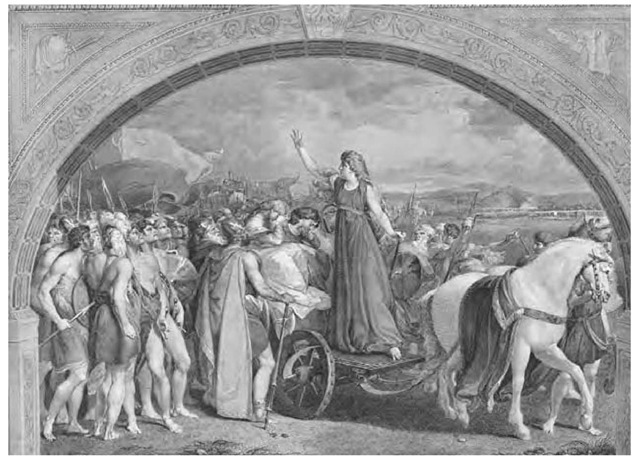Leader of a massive rebellion against Roman rule of Britain. The Romans had previously antagonized the Iceni, long-standing clients of Rome, by demanding that they disarm while Rome conquered Wales. This was further aggravated by the demands of the nearby military colony constructed at Colchester (Camulo-dunum) and the sudden death of Prasutagus in the year 59. Boudicca, who probably married him around 43-45, had two daughters and seems to have inherited the chieftaincy of the Iceni. A Roman observer later described her as very tall, red haired, and wearing the torque and armor of an Iceni war leader. The Roman procurator for the area, Catus Decianus, demanded that the Iceni honor a legacy by Prasu-tagus to Rome, which left the emperor Nero half of the Iceni lands and property. This will was probably a forgery, made to convert previous gifts to the Iceni into a loan, which was being repaid. When Boudicca refused to comply, a Roman force invaded the royal compound, flogged Boudicca and raped her two daughters, then declared the Iceni royal family stripped of its land.
This insult to Boudicca and her tribe could not be ignored, and other Celtic Britons rallied to them, including rogue elements of the Catu-vellauni and Dobrunni, and the full body of the Trinovantes, Coritani, Durotriges, and Brigantes. The fury of the Celts only increased when they learned that the Roman general Suetonius had massacred druids on the sacred island of Anglesey. In response, the Celts attacked Colchester, sacking the town and killing its inhabitants. When a relief force under Petilius Cerealis from the IX Legion attempted to come from Lincoln to help them, they were attacked and defeated in a separate battle in the fens. Boudicca is credited with leading the Celts at both battles, although they occurred too closely together for this to be possible. Notified in Wales, Suetonius raced to London, only to learn that he could get no help from the II Augusta Legion at Gloucester and that the civil administrators in London, including Catus Decianus had fled to Gaul. With no options, he returned to meet his infantry marching from Wales, abandoning London to Boudicca’s swelling army, which attacked and burned it to the ground, looting and displaying the severed heads of the Roman inhabitants.
Despite overwhelming success, Boudicca’s army was racing the clock. Leadership of this large tribal force was fragmented; supplies were dwindling; and the tribes had fought all summer rather than sow their crops. Although she still had superior numbers, Boudicca sought a decisive battle, maneuvering to meet Suetonius somewhere between the towns of Wall and Tourch-ester. Although the Celts may have outnumbered them handily, Roman discipline and use of the terrain allowed Suetonius to hold off the Celts and, even though the numbers are probably exaggerated, may have killed 80,000 while losing only 400 Roman legionaries. Boudicca could expect no clemency from Rome after the atrocities committed at London and left the battlefield for Iceni lands, where she died shortly after the battle, although from wounds or self-administered poison is not known. She was buried secretly, probably with a royal horde of gold.
In the aggressive Romanization of the tribes that followed, Boudicca faded from importance, surfacing again in British history when Elizabethan scholars rediscovered Tacitus and Suetonius, and she quickly became a favorite martial and nationalistic model for Elizabeth I of England and a subject for John Fletcher’s drama and for John Milton. Victorian fascination for Boudicca centered on her maternal role, emphasized by Tennyson’s "Boudicca," which inspired Prince Albert to push for a statue of Boudicca and her daughters, finally erected on the Thames embankment in 1902. Most recently, Margaret Thatcher was frequently caricatured as Boudicca during the Falkland War.
Celtic Queen Boudicca, who led Britons in rebellion against the Romans during the first century A.D.

